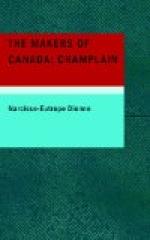“David Quer.
“On board the
Vicaille, July 18th, 1628, and addressed to
Monsieur Champlain,
Commandant at Quebec.”
Champlain read that letter to Pont-Grave and to the chief inhabitants. After mature deliberation, it was resolved that Champlain should answer Kirke with dignity and firmness, but should not give any idea of the poor state of Quebec. “We concluded,” says Champlain, “that if Kirke wished to see us he had better come, and not threaten from such a distance. That we did not in the least doubt the fact of Kirke having the commission of his king, as great princes always select men of brave and generous courage.”
Champlain acknowledged the intelligence of the capture of Father Noyrot and de la Tour, and also the truth of the observation that the more provisions there were in a fortress the better it could hold out, still it could be maintained with but little, provided good order were kept; therefore, being still furnished with grain, maize, beans and pease, (besides what the country could supply) which his soldiers loved as well as the finest corn in the world, by surrendering the fort in so good a condition, he would be unworthy to appear before his sovereign, and would deserve chastisement before God and men. He was sure that Kirke would respect him much more for defending himself than for abandoning his charge, without first making trial of the English guns and batteries. Champlain concludes by saying that he would expect his attack, and oppose, as well as he could, all attempts that might be made against the place. The noble language of Champlain’s letter made a deep impression on Kirke, and he deemed it prudent to start for Europe. Before leaving Tadousac, David Kirke destroyed all the captured French barques, with the exception of the largest, which he took to Europe. Since leaving England he had doubled the number of his vessels, having taken away all that he could from the habitation of Miscou and other seaports frequented by the French.




